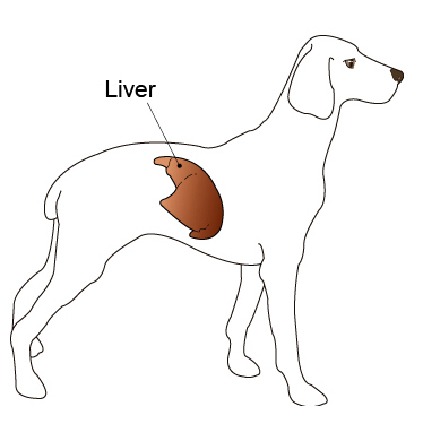The liver is a unique organ with several important functions in the body. For various reasons, the liver can become inflamed, resulting in a clinical syndrome called canine chronic hepatitis. This week, I discuss this important disease entity including details about diagnosis and treatment. Happy reading!
Canine Chronic Hepatitis – What is it?
The liver is unquestionably a vital organ. It has central roles in digestion, hormone production, detoxifying blood, metabolism, and blood clotting. Infections, toxins, genetic disorders, and various drugs may disrupt normal living functions. Any of these factors can induce a chronic, vicious, self-perpetuating cycle liver cell injury and scarring. Inflammatory cells from the bloodstream enter the liver in response to previous exposure to infectious organisms, toxins, and/or an abnormal signal from the patient’s own immune system. The result is liver cell damage, cell death (called necrosis), and perpetual inflammation.
Several factors can (or are suspected to) trigger canine chronic hepatitis:
- Infections (i.e. leptospirosis, infectious canine hepatitis virus)
- Drugs (i.e.: anti-seizure medications, corticosteroids, non-steroidal anti-inflammatory drugs, lomustine/CCNU)
- Copper – click here for more information
Additionally, many breeds have genetic predisposition to and/or increased prevalence for chronic liver inflammation, including:
- Doberman pinschers
- West Highland white terriers
- Labrador Retrievers
- Cocker spaniels
- Kerry Blue terriers
- Maltese
- Bedlington terriers
- Standard poodles
- German shepherds
- Bernese mountain dogs
- Beagles
Canine Chronic Hepatitis – What does it look like?
Chronic hepatitis may occur in dogs of any age or sex, but middle-aged and geriatric patients are over-represented. As mentioned earlier, several breeds have an increased prevalence of disease. There are no clinical signs that are diagnostic for chronic hepatitis. Rather, affected dogs often have vague and episodic signs of illness, including:
- Lethargy & weakness
- Vomiting
- Weight loss
- Reduced (or loss of) appetite
- Diarrhea
- Abdominal discomfort
- Yellowing of the skin and “whites of the eyes” (called icterus or jaundice)
- Increased thirst / frequency of urination
- Neurological deficits and/or seizures
- Fluid accumulation in the abdominal cavity (called peritoneal effusion or ascites)
- Bleeding
Canine Chronic Hepatitis – How is it diagnosed?
After obtaining a complete medical history and performing a thorough physical examination, your family veterinarian will likely recommend some initial non-invasive blood and urine tests, as well as abdominal diagnostic imaging. These tests typically show markedly elevations in various liver enzymes and indirect liver function values like blood urea nitrogen (BUN), glucose, albumin, cholesterol, and total bilirubin. Click here to learn more about liver enzymes.
The veterinarian should also check a patient’s ability to properly clot blood. Direct liver function testing, including serum bile acids and blood ammonia levels, may be recommended if total bilirubin levels are normal but liver disease is strongly suspected. Diagnostic imaging like abdominal radiography/x-rays and abdominal sonography may identify size and/or architectural changes to the liver itself. Partnering with a board-certified veterinary internal medicine specialist can be helpful to develop a logical and cost-effective diagnostic plan.
Ultimately, a liver biopsy is required for definitive diagnosis. I’ve previously discussed how a veterinarian may obtain biopsy from a dog’s liver. Please click here for more information about liver sampling. Watch the video below of a veterinarian obtaining a liver biopsy via laparoscopy.
I strongly recommend families collaborate with a board-certified veterinary internal medicine specialists and/or surgeon to ensure the most appropriate liver samples are evaluated:
- Liver tissue for routine histopathology
- Bile fluid and liver tissue for culture
- Liver tissue for quantification of important mineral elements (i.e.: zinc, copper, iron)
Canine Chronic Hepatitis – How is it treated?
Canine chronic hepatitis is not a curable condition. When diagnosed early, chronic hepatitis tends to be a slowly progressive syndrome. Indeed, many dogs may survive for prolonged periods without treatment. Thankfully, early identification and intervention seemingly and significantly prolongs life. A multimodal approach is recommended for patients living with chronic hepatitis, including:
- Eliminating / treating any identifiable underlying cause
- Antibiotic therapy
- Liver protective supplements (i.e.: s-adenosylmethionine/Deonsyl™, vitamin E, silibinin, phosphatidylcholine/PhosChol®, ursodiol/Actigal™)
- Anti-liver scarring medications (i.e.: corticosteroids, phosphatidylcholine/PhosChol®, colchicine/Colcrys™)
- Immunomodulatory drugs to change how the immune system contributes to inflammation (i.e.: corticosteroids, cyclosporine/Atopica™, azathioprine/Immuran™, mycophenolate/CellCept®)
- Diuretic medications to help remove abnormal abdominal fluid (i.e.: spironolactone/Aldactone™, furosemide/Lasix™)
- Anti-nausea medications / Gastrointestinal protectants (i.e.: famotidine/Pepcid AC™, omeprazole/Prilosec OTC™, sucralfate/Carafate™, metoclopramide/Reglan™, ondansetron/Zofran™, dolasetron/Anzemet™)
- Liver-friendly diet
Not every patient with chronic hepatitis needs every type of medication listed above. Pet parents will likely find it particularly helpful to meet with a board-certified veterinary internal medicine specialist to maximize the likelihood of developing a logical, safe, and effective treatment plan.
The take-away message about canine chronic hepatitis…
Chronic hepatitis in dogs is a syndrome of ongoing inflammation in the liver that can be triggered by a variety of factors. Affected dogs have episodic and vague clinical signs. Early accurate diagnosis and treatment are keys to maximizing the likelihood of positive long-term outcome.
To find a board-certified veterinary internal medicine specialist, please visit the American College of Veterinary Internal Medicine.
To find a board-certified veterinary surgeon, please visit the American College of Veterinary Surgeons.
Wishing you wet-nosed kisses,
cgb



